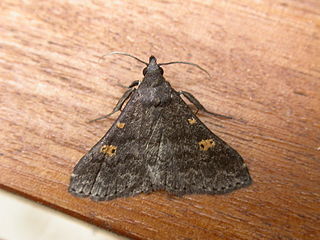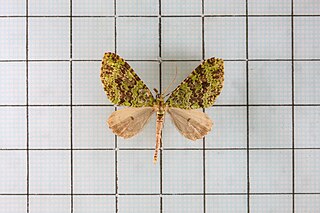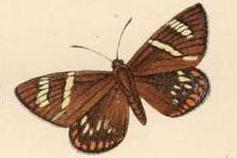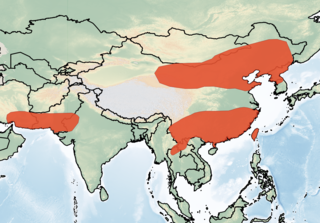
Microbiota is a monotypic genus of evergreen coniferous shrubs in the cypress family Cupressaceae, containing only one species, Microbiota decussata. The plant is native and endemic to a limited area of the Sikhote-Alin mountains in Primorskiy Krai in the Russian Far East. Microbiota is not to be confused with the range of microorganisms of the same name. The genus name was derived from micro-, meaning "small", + Biota, the genus name for a closely related conifer, a species formerly called Biota orientalis, now renamed Platycladus orientalis.

Endoclita is a genus of moths of the family Hepialidae. There are 60 described species found in eastern and southeast Asia and the Indian subcontinent.

Naarda is a large genus of erebid moths currently encompassing 108 species. Initially identified by Francis Walker in 1866, it is in the family Erebidae. Somewhat ruddy in appearance, this genus is distinguishable for its generally slender thorax and abdomen, and straight, porrect labial palpi. Most species are a light tan color, but shading can reach as deep as a charcoal, with muddy yellow, conspicuous reniform, orbicular stigmata featured on the forewings, sometimes reflected bilaterally superior.

The Cuban slider is a species of turtle native to Cuba, but has also been introduced to Grand Cayman and Cayman Brac in the Cayman Islands, and Marie Galante in Guadeloupe.

Alcis is a genus of moths in the family Geometridae described by John Curtis in 1826.

Schistostege is a genus of moths in the family Geometridae erected by Jacob Hübner in 1825.

Tristeirometa is a genus of moths in the family Geometridae.

Asota heliconia is a moth in the family Erebidae. It is found from the Indo-Australian tropics east to Queensland and the Solomons.

Asota plana is a moth in the family Erebidae first described by Francis Walker in 1854. It is found from the Oriental tropics east to New Guinea.

Pyralis manihotalis is a moth of the family Pyralidae described by Achille Guenée in 1854.
Scopula actuaria is a moth of the family Geometridae. It was described by Francis Walker in 1861. It is found throughout the Oriental tropics of India, Sri Lanka, from Afghanistan and Taiwan to the southern Moluccas and Timor. It is also found on the Chagos Archipelago.

Geyeria is a genus of moths within the family Castniidae.

Geyeria decussata is a moth in the Castniidae family.

Schistostege decussata is a moth of the family Geometridae. It is found in south-eastern and eastern Europe up to Ukraine. In Hungary and Lower Austria, the yellow-brown form is found.

Ecliptopera muscicolor is a moth of the family Geometridae. It was described by Frederic Moore in 1888. It is found in India, Sri Lanka and Taiwan.
Eupithecia decussata is a moth in the family Geometridae. It was described by Claude Herbulot in 1997. It is found in the Republic of Congo.
Cyclophora decussata is a moth in the family Geometridae. It is found in Suriname, French Guiana and Brazil.
Miltochrista decussata is a moth of the family Erebidae. It was described by Frederic Moore in 1877. It is found in eastern China.
Cryptolechia is a genus of moths in the family Depressariidae.

The Oriental serotine is a species of bat in the family Vespertilionidae. It is widespread and found throughout Asia.












